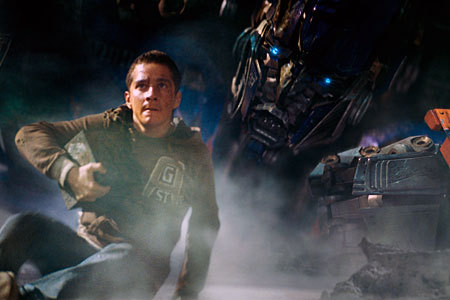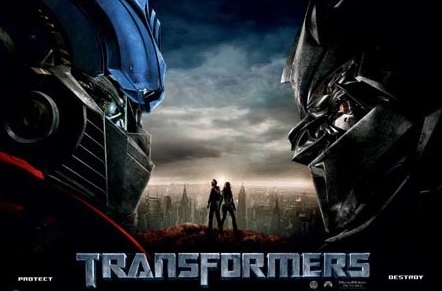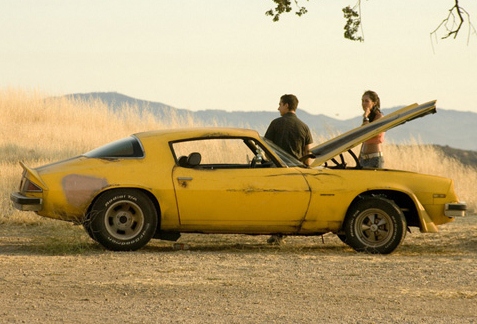Sam Witwicky: Greatest Hero of Our Time [Part 1]
(This is the beginning of a three-part analysis of the Transformers mythology. Warning: each article contains spoilers for the movie it covers.)
Every generation has its own hero, a character who stands for and defends the social mores of the particular time and place in which he or she exists by combating hostile forces and ideals that are detrimental to the preservation of the hero’s own society. These heroes, unmistakably present in all forms of art, are the life-blood of their culture, displaying and perpetuating what is collectively honored and desired therein. In his epic poems The Iliad and The Odyssey, Homer sang of the almost-unbeatable warrior Achilles and the cunning Odysseus to suit the needs and wants of ancient Greece. With The Divine Comedy, Dante Alighieri created a fictionalized version of himself to break through the barriers of the eternal spheres of God–journeying from hell and purgatory to a heavenly enlightenment–while facing the demons, ancient and ever-timely, of Renaissance Italy. And now, along these similarly epic lines, director Michael Bay has offered up the hero of our time in the Transformers movie trilogy: Sam Witwicky, the 21st Century American hero who speaks to and for us.
Never has the American public had such an ideal proxy in the film medium. Sam exhibits everything that we believe in and deem to be characteristics of American greatness: he is a possessor of far-reaching freedom, American know-how, and a remarkable perseverance aimed at actualizing his own import and ambitions. And all of these facets are cumulatively utilized to transform his station in life just like the Transformers whom he befriends and identifies with (and they similarly acknowledge him as a transforming compatriot). In the midst of all the robot warfare and extraterrestrial quandaries, each idiosyncratic characteristic that is ingrained in the American character plays out in the character of Sam, enlivening who we are and what we aspire to be in the process. In turn, each film is a razor-sharp look at contemporary American life, each a slice of Americana projected onto the big screen, and the tripled effect of the series adds up to a whole American pie, a cohesive sequence that shows the pursuit of happiness–the American Dream–that now takes place in this country at this time.
Transformers: Autonomy, Autobots, and Sam’s Auto-Mobility
At the very heart of the war between the Transformers, and as the impetus behind each metallic blow and slow-motion projectile, there is the fundamental battle over self-determination, the ability to do what one wishes. The Autobots, as their name clearly suggests, stand firmly on the side of autonomy while the Decepticons have two opposing goals in mind to combat their foes’ position: to rule over all things and destroy anything that stands in their way (or, as expressed in a sly distortion of the police motto during the film, “to punish and enslave”). To do this, the Decepticons seek the All Spark, a cube that gives them the power to create self-sufficient life out of technology–self-sufficient, but not free. Once activated, these life forms become instantly allied with the Decepticons. They become cogs in the machine of war and destruction. And because of the Decepticons’ desire to produce more non-autonomous Transformers, the Autobots wish to destroy the All Spark. To them, there is no such thing as life without freedom; if there is no ability to choose which side (or any side) to join, then a Transformer has no real transformability.
Incidentally, humans seems to always fall into both tyrannical goals of the Decepticons. They are either to be ruled or destroyed (or, in special occasions, both). During a fateful encounter between the leaders of each band of Transformers, Optimus Prime of the Autobots and Megatron of the Decepticons, both philosophies clash in a weighty dialogue, and humans are the topic of discussion:
Megatron: Humans don’t deserve to live!
Optimus Prime: They deserve to choose for themselves!
This condensation of their philosophies into a battle of wits over human mortality is a superb achievement. While Megatron believes that humans should die, regardless of what they have done (and regardless of their own facility and freedom), Optimus acknowledges that they should have a choice in the matters of life and, in this case, death. If they wish to die, then they should die. The choice is each person’s right (as is the right of all sentient beings); freedom is for all, equally.
Indeed, every significant character in the first Transformers film takes on a better sense of freedom in their lives. After their military base is destroyed by the Decepticons, Captain William Lennox (Josh Duhamel) and Sergeant Robert Epps (Tyrese Gibson) find themselves taking fewer orders from others and increasingly dictating their own courses of action until they finally “bring the rain” whenever they wish (which is quite a bit). The hot, criminal past of Mikaela Banes (Megan Fox) is eliminated (even though it is at one point said to be in her “gene pool”) and her attraction to uptight high school boys is eventually done away with when she finds the most independent boy of them all–Sam Witwicky (Shia LaBeouf), extraordinary exerciser of freedom and the great hero of the series.
But Sam was not always a great hero, nor was he very free. He begins as a kid without much: he is an unpopular student desperately trying to get good grades (as well as attempting to sell his family heirlooms) in order to obtain his first car. The acquisition of the first car is one of the most American rites of passage because it brings about a greater sense of liberty. With the car, he will be able to go where he wants, see what he wishes to see, and, if all goes accordingly, be what he aspires to be. His car can take him on the journey to self-determination because it is self-determination to him. And the synchronization of the first car and this notion of personal freedom is a purely American perspective. At this stage in his life, the car is his dream, and even though to follow that dream may be challenging, it is nevertheless worth following because freedom is worth experiencing.
Sam Witwicky: Fifty years from now, when you’re looking back at your life, don’t you want to be able to say you had the guts to get in the car?
Of course, the car is no simple car; it is an Autobot in disguise, named Bumblebee. But the convergence of storylines–linking the war between Transformers over the All Spark and the American rite of passage in the boy-and-his-first-car thread–is nevertheless perfectly fused together. Concept and execution are seamlessly joined. Throughout the entire film, Sam’s interactions with Bumblebee are ways of coming to term with his own self-determination. The more he is able to do, the more he is free. His hands are on the steering wheel up until the moment when Sam grabs the All Spark in the name of the Autobots and autonomy, which flies in the face of Megatron:
Megatron: Give me the All Spark, and you may live to be my pet.
Sam Witwicky: I’m never giving you this All Spark!
Sam, rejecting servitude (a life without autonomy), defies the Decepticon leader, thus remaining the absolute possessor of liberty. Even in the face of death, he chooses life because he chooses choice over becoming a pet. And, because of his sacrifice (which, in turn, helps Sam to realize his own family motto–No Sacrifice, No Victory–in a very real way), the Autobots are able to do away with the All Spark and defeat the Decepticons. Freedom is not only preserved, it is enhanced throughout the world and the universe. And at the center of the free universe is Sam, American hero and car-owner.
Continue to Sam Witwicky: Greatest Hero of Our Time (Part 2)






